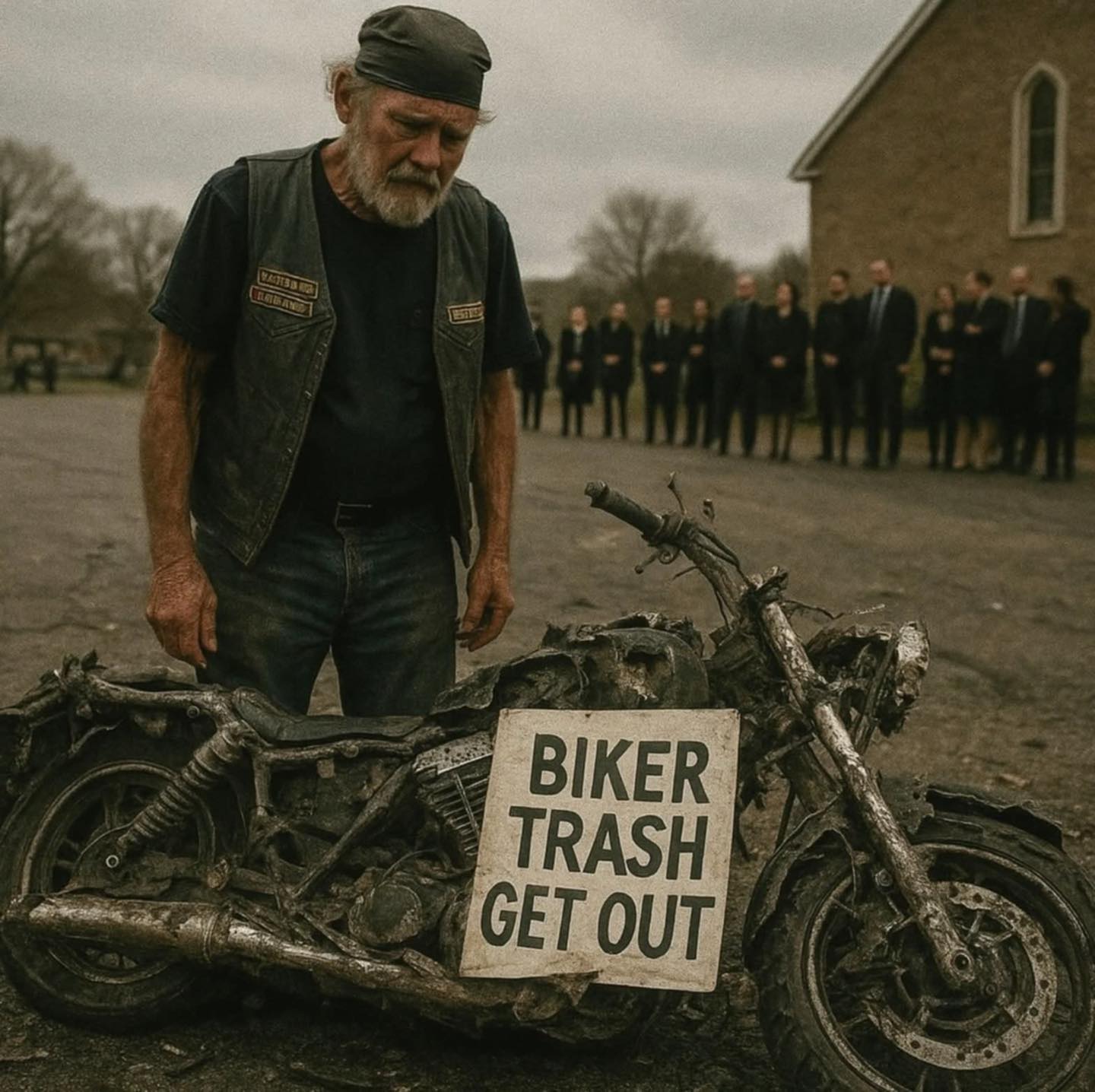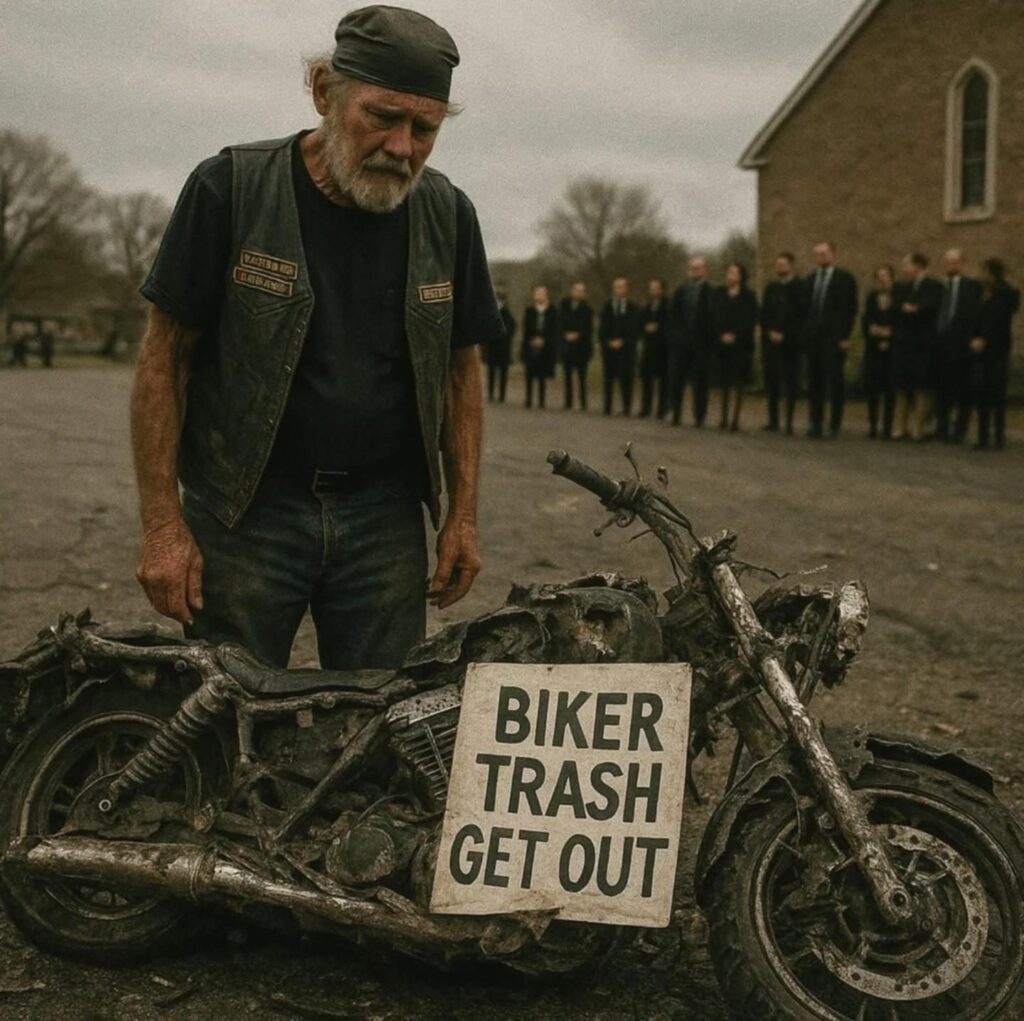Someone wrecked my motorcycle while I was at my wife’s funeral, right there in the church parking lot. They did it just because they didn’t like an older man in a leather vest who didn’t match their fancy, country club lifestyle.
I had parked my carefully kept Harley Electra Glide for the service. When I came back out, already heartbroken from losing my wife, I found it knocked over, badly damaged, with a sign saying “BIKER TRASH GET OUT” stuck on it.
 This wasn’t random—it was personal. It came from the same so-called “respectable” people who had acted kind during the funeral, pretending they cared.
This wasn’t random—it was personal. It came from the same so-called “respectable” people who had acted kind during the funeral, pretending they cared.
It all began six months ago when we moved to Cedar Hills, a fancy planned neighborhood. Barbara’s cancer had returned—stage four—and our old home was too much for her to handle.
Our daughter Caroline found us a small house in what she called a “nice neighborhood.” What she really meant was “proper.” What she meant was “no bikes.” What she meant was “Dad, it’s time to change.”
I wasn’t about to change who I was at seventy-two. My 2008 Harley Electra Glide, which I called the Black Widow, had been with me through fifteen states and two major surgeries—and it came with us when we moved. The problems began the very first day.
Howard Parkman, the head of the homeowners’ association, showed up at our door before we even unpacked. He had a clipboard and a fake smile.
“Welcome to Cedar Hills,” he said, glancing past me at Barbara giving directions to the movers. “Just wanted to give you our community rules. Be sure to check section 12-B about transportation.”
I already knew what he meant before I looked. The rule said: “No recreational vehicles, boats, or motorcycles can be parked in driveways or where people can see them from the street.”
“My bike goes in the garage,” I told him, looking him straight in the eye. “It has for forty years.”
Howard’s smile got tighter. “That’s okay for now. But people in Cedar Hills usually drive more… traditional cars. We have certain standards here.”
Barbara came up next to me, her hand in mine. Even though she was weak from chemo, her voice was firm.
“My husband’s been riding that bike since before you got your first car, Mr. Parkman. It’s not going anywhere.”
Howard glanced at her headscarf and backed off.
“We can talk about it another time,” he said, walking away. “Welcome to the neighborhood.”
And now, that same Howard was watching from across the parking lot. The little smirk on his face said it all. He thought he’d won. Thought he’d broken the old biker.
For six months, Barbara was fighting cancer, and I was dealing with the neighborhood. People reported me for “too much noise” if I started my bike before 8 a.m. I got anonymous complaints about oil stains on the driveway (there weren’t any—I take great care of it). And people left notes on my Harley whenever I parked it outside to clean the garage.
Every time something happened, Howard would show up with his clipboard and that same fake smile.
“Just a reminder about rule 12-B,” he’d say. “Some neighbors are worried.”
Even as she got sicker, Barbara found it kind of funny.
“They think a motorcycle is the biggest problem around here?” she’d say with a weak laugh. “Wait till I start haunting the place.”
But everything changed after Barbara passed away one Tuesday morning in October. I held her hand as she left—the woman who’d ridden thousands of miles with me, always by my side, never once asking me to change who I was.
Her funeral was on Friday. Caroline flew in from Seattle, and Michael drove up from Texas. Our house filled with casseroles from the same neighbors who had just been complaining about my bike.
That night, Caroline spoke gently. “Dad, maybe it’s time to think about selling the Harley. Mom’s gone. You’re seventy-two. And clearly, this neighborhood doesn’t fit with that lifestyle.”
I looked at her—my daughter, a lawyer, a mom of two, driving a practical SUV—and saw how far she’d come from the little girl who used to love riding in my sidecar, wearing her tiny leather jacket.
“The bike stays,” I said. “Your mother never asked me to give it up. Not once.”
She started to say, “But Mom’s not—” and stopped, but I knew what she meant: Mom’s not here anymore.
“The bike stays,” I said again, ending the talk.
On the morning of the funeral, I rode my motorcycle to the church early to meet the pastor. Some people gave me disapproving looks when they heard the engine, but I didn’t care. This is how Barbara would’ve wanted me to show up—on two wheels, like always.
The service was lovely. Even Howard and his wife came, along with most of the neighbors. They said nice things about Barbara and gave me their condolences. Howard even seemed surprised that I was wearing a suit and nodded, like I’d finally met his standards.
Then I walked outside and saw my motorcycle had been vandalized.
“Oh my God,” Caroline said, running over. “Dad, I’m so sorry.”
I didn’t say anything. I just stared at the broken bike and the hateful message sprayed across it—something Barbara had helped me pick out and care for. People around us whispered in shock, but I noticed that not many of our neighbors looked surprised.
Officer Reynolds, who came when I called, shook his head as he wrote his report.
“Never got why people go after bikes,” he said. “It’s cowardly.”
“This wasn’t random,” I told him. “It was personal.”
He looked at me. “You think someone would do this at a funeral?”
I looked across the parking lot at Howard, standing with other Cedar Hills residents, clearly satisfied with what had happened.
“More than I realized,” I said.
Even though the bike was damaged, it could still run. Caroline wanted to load it into her rental car and take me home, but I said no.
“I’ve ridden through worse,” I told her.
The truth was, I needed that ride. I needed the wind, the sound of the engine, and the feel of the bike beneath me. I needed something to break through the emptiness Barbara had left behind.
Back at the house, friends and family gathered for the reception. I changed out of my suit into jeans and a shirt but kept my leather vest on—the one with my Vietnam Veteran patch and the logo of the Iron Horses MC, the club I’d ridden with for years.
Howard came over while I was standing by the food table, holding a plate of untouched sandwiches.
“Terrible about your motorcycle,” he said, though he didn’t sound like he meant it. “Maybe it’s a sign to think about something more… fitting for Cedar Hills.”
I looked him in the eye. “The only sign I see is that someone here’s a coward who damaged my bike during a funeral.”
He turned red. “I don’t know anything about that.”
“Never said you did,” I said. “But whoever did should know something about me.”
“What’s that?” he asked, clearly curious.
“I’ve buried my wife, my parents, and sixteen brothers I rode with. I’ve got nothing left to lose.” I leaned in. “And I always find out who’s done me wrong.”


